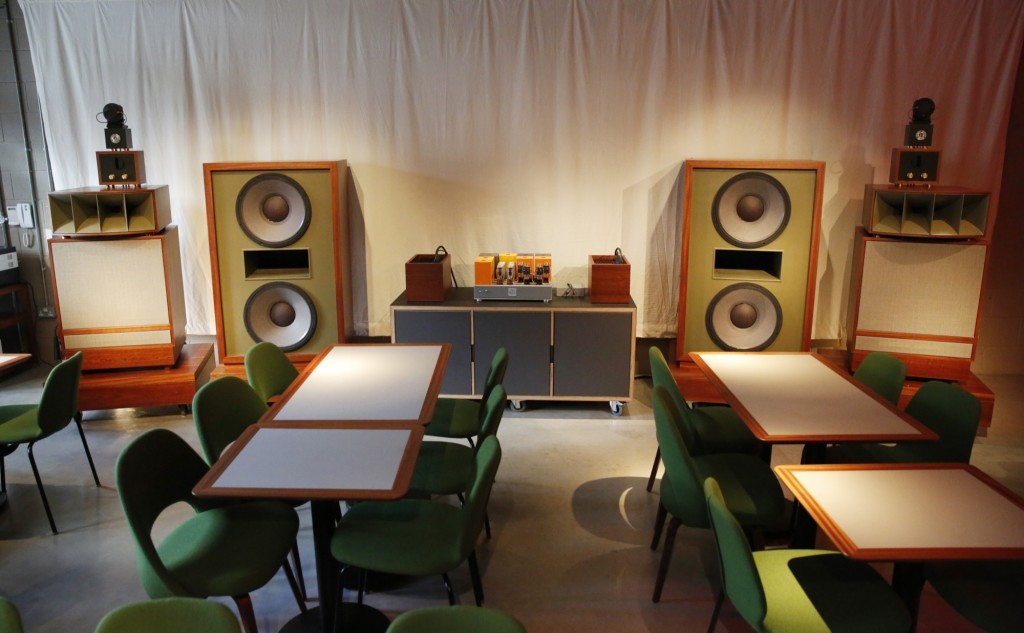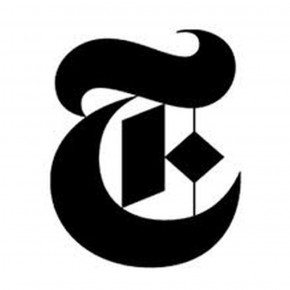
Spiritland in central London claims to offer “the best sound system in the world.” (Photo: Frederick Bernas)
 LONDON — One Sunday evening in September, the main hall of a community center here was decked out with ribbons, balloons and a gyrating disco ball that marked a sonic sweet spot — the optimal position for partygoers to enjoy the clean, punchy (and not too loud) sound of five towering speakers, arranged strategically around the room, piping a playlist of pop, funk, rock and dance floor gems for all generations.
LONDON — One Sunday evening in September, the main hall of a community center here was decked out with ribbons, balloons and a gyrating disco ball that marked a sonic sweet spot — the optimal position for partygoers to enjoy the clean, punchy (and not too loud) sound of five towering speakers, arranged strategically around the room, piping a playlist of pop, funk, rock and dance floor gems for all generations.
The Lucky Cloud sound system was in town. Following the lead of a cult party series created by the D.J. and impresario David Mancuso in 1970s New York, the organizers prioritize audio quality above all else. With Mr. Mancuso’s blessing, they began running events in London in 2003, initiating a slow-burn trend that has spread around the city: A string of “listening clubs” now invite people to experience recorded music played through hi-fi rigs that most humble audiophiles can only dream about.
The newest is Spiritland, a cafe/bar in central London that claims to offer “the best sound system in the world” — an imposing array that dominates the room like a shrine in a temple. Two sets of bulky yet elegant speakers finished in vintage wood sit on either side of an Italian amplifier with colorful valves and tubes that glow orange when the lights are low.
“I always wanted to go somewhere which could be all about musical appreciation, to hear someone dig really deeply into their record collection and explore their private passions,” said Paul Noble, Spiritland’s creative director. After two successful years with a pop-up venture at a restaurant in East London, his team found a permanent home and invested heavily in their customized system, designed by the British company Living Voice. It is valued at just under half a million dollars.
“These speakers were built totally without compromise,” Mr. Noble said. “When you have equipment this good, it can deliver such high quality that it emotionally connects you to the music. We’re not afraid to say that listening to music is a very magical thing.”
That mystical philosophy echoes back to New York City, where Mr. Mancuso obsessed over the hi-fi setup for his weekly Loft parties in the 1970s and ’80s. Purity was paramount: Mr. Mancuso stripped away mixing equipment used by many D.J.s, imagining that fewer cables and boxes would liberate the sound waves and, consequently, his guests on the dance floor.
Tim Lawrence, the author of books including “Love Saves the Day: A History of American Dance Music Culture, 1970-1979,” explained: “The D.J. didn’t mix or perform tricks on the equalizer. The D.J. divested themselves of their ego, stopped trying to interfere with the music, and they just chose really good tunes.” When Mr. Mancuso had the idea of taking his Loft concept to London in 2003, he called Mr. Lawrence — and the Lucky Cloud sound system was born.
Another Mancuso disciple to join the effort was Colleen Murphy, an American D.J. who regularly played at the Loft before moving to England and is now a familiar face behind the Lucky Cloud decks. In 2010 she began Classic Album Sundays, turning one of her favorite social activities into a public gathering: Every month, people are invited to hear a culturally significant record on vinyl with luxury audio gear.
“Younger people don’t really share music anymore,” said Ms. Murphy, 48, who aims to push back against “shuffle culture” with her events, which have spread to Amsterdam, Sydney, Chicago and Tokyo, among other cities. “People don’t give themselves the time and space to listen to a full album,” she continued. “They listen to MP3 files in earbuds, losing half of the sonic information.”
The growth of London’s audiophile scene runs parallel to a recent resurgence in global vinyl sales, which hit a 28-year-high in 2016. High-fidelity streaming services like Tidal and home sound systems like Sonos represent a philosophical shift to quality over convenience in digital consumption, but the tactile charm and full sound of vinyl is here to stay.
At a recent Classic Album meeting, a pair of Klipsch La Scala speakers (valued at $8,000) were installed in the basement bar of an east London hotel on either side of a Rega P9 turntable at center stage. The audience sat in rapt silence for New Order’s 1983 record “Power, Corruption & Lies,” taking in every detail of the sparkling electro-pop riffs, soaring vocals and bouncy polyrhythmic beats.

The D.J. Colleen Murphy interviewing Peter Hook, former bassist with New Order, before a listening session at the Miranda bar in East London. (Photo: Frederick Bernas)
During an onstage conversation with Ms. Murphy before the listening session, Peter Hook — a former bassist with New Order, also known for his work with Joy Division — spoke about designing sound systems that “made the tip of your nose tingle” at British nightclubs in the 1980s.
“In those days, because they were analog, they had a warmth that now has to be created,” Mr. Hook, 60, said in an interview. “It’s very difficult to get the fullness of the old days, which is hard to manufacture,” he continued. “It’s always a bit too clicky and a bit too digital. I think digital has a lot to answer for.”
In London’s northeast neighborhood of Dalston, the Brilliant Corners restaurant lives up to its name: Large floorstanding speakers by Klipsch (worth $6,000 each) are placed in each corner of the main room. The venture was opened three years ago by Amit and Aneesh Patel, two brothers who had discovered the pleasure of deep listening at Lucky Cloud parties.
“I hope this audiophile movement questions the model about what kind of sound systems are installed in public places,” said Amit Patel, who left behind his career as a lawyer to start up the restaurant.
“In the big nightclubs, they spend thousands on interiors, toilets, whatever,” added Aneesh Patel, “but they have sound systems that distort all the time, and everyone thinks it’s normal to leave with your ears ringing.”
Brilliant Corners also hosts pop-up events like Classic Album Sundays or the occasional jazz kissaten — a listening session run by Gearbox Records, a label and mastering studio that works exclusively with vinyl. In Japan, a typical kissaten is a coffee shop with audiophile equipment and a huge jazz collection.

Gearbox Records founder Darrel Sheinman at his studio in central London. (Photo: Frederick Bernas)
“You’re in a tiny room, and the immense speakers swallow half of it,” said the founder of Gearbox, Darrel Sheinman, who visits Japan every year. “You walk in, grab a coffee or a glass of wine, and listen for as long as you like — without talking.”
Mr. Sheinman, an entrepreneur and record collector, started Gearbox in 2009 as a hobby, and it became his full-time job in 2012. His studio is packed with rare analog apparatus including a Haeco Scully vinyl-cutting lathe and a Studer C37 tape recorder, thought to be one of two in existence. The label’s catalog spans jazz, avant garde electronica and American folk, featuring emerging artists and archive sessions from the BBC vaults or other sources.
“In a world that doesn’t linger too long on anything, we’re trying to bring a bit of ritual back into listening to music,” said Adam Sieff, the marketing and sales director at Gearbox. “Take a deep breath, sit down, take the music a little bit more seriously — and enjoy it.”
Published by The New York Times, 30/10/16 – click here for original.










